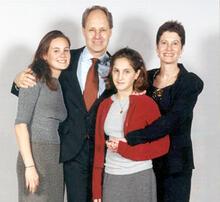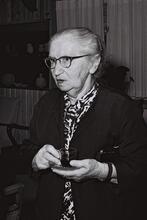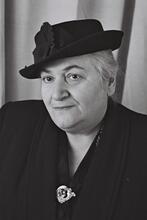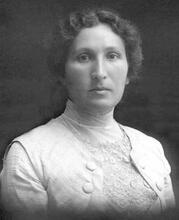Tzipi Livni
Portrait of Israeli politician Tzipi Livni. Photograph by Tal Givony. Source: Wikimedia Commons.
Born in Tel Aviv in 1958 to a family of prominent Irgun Zvai Leumi revolutionaries, Tzipi Livni grew up immersed in the world of Israeli politics. After serving in the IDF, working for the Mossad, and practicing as a lawyer in her young adulthood, Livni entered the political arena in 1996 as a member of Likud. From 1996 to 2019, Livni served as a member of six consecutive Knessets. During this time, Livni worked in more governmental roles than any other woman in Israeli history, including powerful positions like Vice Prime Minister, Minister of Justice, and Minister of Foreign Affairs. Her efforts in various Israeli-Palestinian peace negotiations made her one of Israel’s foremost diplomatic talents, and Livni continues to work towards the advancement of diplomacy on the international stage.
Early Life and Military and Intelligence Service
Tziporah “Tzipi” Malka Livni was born on July 8, 1958, to Eitan and Sara Livni, both of whom were former members of the Revisionist Zionist paramilitary organization Irgun Zvai Leumi during the British Mandate in Palestine. Eitan was the Irgun’s Chief Operations Officer and later served in the Lit. "assembly." The 120-member parliament of the State of Israel.Knesset with the Herut and Likud parties from 1974 to 1984. Eitan and Sara’s marriage was the first official marriage ceremony in Israel after the state’s founding in May 1948. Livni’s brother—named Eitan after their father—also works in politics as a member of the Likud party.
As a teenager, Livni was a member of Betar, the youth branch of Revisionist Zionism. Her experience in Betar forged her political outlook in the image of the Revisionist Zionist principles of Ze’ev Jabotinsky and Menachem Begin, especially in relation to adopting a strong sense of Jewish national identity, a deep respect for democracy, and a commitment to the idea of the individual and its accompanying universalist principles. These political values would continue to guide Livni throughout her career and inform her reputation for being a firm but judicious force in politics and diplomacy.
Livni achieved the rank of First Lieutenant in the IDF, and, after her discharge in 1979, began studying law at Bar Ilan University in Ramat Gan. In 1980, she left Bar Ilan University to serve in the Mossad, Israel’s national intelligence agency. Livni worked for the Mossad from 1980 to 1984 before retiring from the agency and returning to Bar Ilan University to finish her law degree. Her time in the Mossad coincided with Operation Wrath of God, the Mossad’s retaliation for the 1971 Munich Massacre; while Livni has never confirmed that she was involved in the operation explicitly, there has been much speculation in Israeli society regarding whether or not she participated in missions related to this operation. She graduated from Bar Ilan University with an LLB in 1984 and spent the next decade working in commercial, public, and real estate law. In 1984, Livni married Naftali Spitzer, and they had two sons: Omri, born in 1987, and Yuval, born in 1990.
Entry into Politics and Early Career with Likud
After ten years practicing law, Livni decided to begin a career in Israeli politics. In 1996–one year after the assassination of Israeli Prime Minister Yitzhak Rabin and the subsequent collapse of the Oslo Accords–Livni joined the Likud party, then headed by Benjamin Netanyahu. Although she ranked too low on Likud’s list to become a member of the Knesset in the 1996 elections for the Fourteenth Knesset, Netanyahu appointed her in a special position as Director General of the Government Companies Authority. In this role, Livni supervised the privatization of Israeli government corporations and monopolies. She held this position for three years, from 1996 to 1999.
Livni became a member of the Knesset with Likud for the first time in the 1999 elections for the Fifteenth Knesset. By this time, former mythologized Israeli Army commander Ariel Sharon had replaced Benjamin Netanyahu as head of Likud. The Fifteenth Knesset–which lasted from 1999 to 2003–encompassed a number of seismic convulsions in Israeli history, including the failure of the Camp David Summit in 2000, the beginning of the Second Intifada, Ehud Barak’s loss of the premiership to Ariel Sharon in 2001 in just the second special election for the office of the Prime Minister in Israel’s history, and Sharon’s subsequent convention of a national unity government.
In spite of its tumultuousness, Livni retained her status as a member of the Knesset for the entirety of the Fifteenth Knesset. In this time, she held a number of appointed government roles, including Minister of Regional Cooperation, Minister Without Portfolio, and Minister of Agriculture and Urban Development.
Career at the Start of the 21st Century and Move to Kadima
Livni remained a member of the Knesset with Likud following the 2003 elections for the Sixteenth Knesset, which ran from 2003 to 2006. During the Sixteenth Knesset, she again served in a number of government positions. These positions included Minister of Immigration and Absorption and Minister of Constructions, as well as more significant postings as Minister of Justice and Minister of Foreign Affairs. In 2004, Livni received the Abirat Ha-Shilton (“Quality of Governance”) award for her trustworthiness and proficiency, particularly in her work supporting new immigrants to Israel.
In 2005, Ariel Sharon’s plan for Israel’s disengagement from Gaza provided Livni with the opportunity to step into the forefront of Israeli diplomacy and foreign relations, the arena for which she is perhaps best known. Although Livni began her political career staunchly opposed to territorial concessions such as those outlined in the Oslo Accords in the mid-1990s, by 2005 she shifted to endorsing reasonable territorial concessions in the interest of keeping Israel a Jewish and democratic state. Livni was one of the most effective proponents of Sharon’s disengagement plan in Likud, and as Minister of Justice during the roll-out of Sharon’s plan she oversaw the legality, legislation, and implementation of Israel’s disengagement from Gaza.
Sharon’s plan for disengagement was not universally welcomed within Likud, and as a result the party fractured into a number of different factions. Livni joined Sharon in his new party, Kadima (“Forward”), in 2006.
In January of 2006, Sharon suffered a fatal stroke, prompting elections for the Seventeenth Knesset in March of that same year. Kadima, now headed by Ehud Olmert, won the most seats in the 2006 elections and Livni continued as a member of the Knesset. During this time Livni held positions as Designated Acting Prime Minister, and, most notably, continued in the role of Minister of Foreign Affairs. By this time, Livni had held the most positions, and the highest-ranking government position, of any woman in Israeli history outside of Golda Meir.
As Minister of Foreign Affairs, Livni was the highest authority in Israeli diplomacy. She was the foremost Israeli negotiator in Israeli-Palestinian peace talks during this time, worked to warm Israel’s ties with moderate Arab nations, and played an essential role in securing the UN Security Council resolution that ended the Second Lebanon War. While she was acting as Minister of Foreign Affairs, Time Magazine named Livni as one of the one hundred Most Influential People of 2007, and Forbes named her as one of the World’s Most Powerful Women for three consecutive years in 2006, 2007, and 2008. Former United States Secretary of State Condoleezza Rice—who provided the entry for Time’s list in 2007—lauded Livni for her strength and levelheadedness in what Rice fully admitted was an unenviably difficult job, writing “[Her] strength to endure, indeed to excel, in what were difficult, often heartbreaking, conditions was a testament to her character.”
Olmert resigned as Prime Minister in July 2008 following his indictment on corruption and bribery charges, triggering party elections for Kadima’s new leader. Livni won Kadima’s leadership contest and, as such, was tasked with forming a new government. However, she was not able to form a working majority coalition (citing a refusal to capitulate to the Sephardic-Mizrahi Orthodox party, SHAS), which led to the elections for the Eighteenth Knesset in 2009. Although Kadima received the most votes of any single party in these elections, the mandate to form a government went to Benjamin Netanyahu’s Likud, which was better positioned to build a functioning coalition.
Later Years in the Knesset and Continued Diplomacy Work

Israeli politician Tzipi Livni, seated next to Palestinian chief negotiator Saeb
Erekat, at an Iftar hosted by United States’ Secretary of State John Kerry, 2013.
Courtesy of the United States State Department. Source: Flickr.
From 2009 to 2012, Livni served as the Head of the Opposition in the Knesset. In 2009, Yale University distinguished Livni as a Chubb Fellow for her career in diplomacy; she also received the International Hall of Fame Award from the International Women’s Forum. She resigned from the Eighteenth Knesset in March 2012 following her ouster as the head of Kadima, after an internal party split along more conservative and more liberal lines led to a redistribution of delegates that caused Livni to lose the popular support of the party. But, in November of that same year, Livni returned to politics with the announcement of her own party, Hatunah (“The Movement). She was elected as a member of the Knesset with Hatunah in the 2013 elections for the Nineteenth Knesset, during which Prime Minister Benjamin Netanyahu appointed her as Minister of Justice and chief negotiator with the Palestinian Authority. In December 2014, Netanyahu fired Livni from her post, arguing that Livni’s criticisms of his policy decisions while she was a member of the ruling coalition he put together constituted grounds for her removal as Minister of Justice. The Nineteenth Knesset dissolved that same month.
In 2015, Livni’s Hatunah merged with Isaac Herzog’s Labor Party to form a new party: the Zionist Union. Zionist Union failed to overtake Netanyahu’s Likud in the 2015 elections for the Twentieth Knesset, and Livni again served as Head of the Opposition.
In January 2019, the new head of the Labor Party, Avi Gabbay, surprisingly announced that Labor would not run jointly with Hatunah in any upcoming election, effectively dissolving Zionist Union. Livni and her Hatunah party did not pass the electoral threshold in the 2019 elections for the Twenty-First Knesset. Following those elections, Livni announced her plan to retire from Israeli politics in February 2019. In her statement to the Israeli press about her retirement, Livni drew from the same source of pragmatism and fairness that made her career a success. She stated her decision to personally step away from politics was a necessary progression to maximize the strength of other Israeli political parties that stood a better chance of opposing a Likud increasingly supportive of Israel’s annexation of the West Bank; she affirmed that all of her actions—even the choice to retire—were done in service of sustaining a Jewish and democratic Israel.
Although she has taken a step back from electoral politics, Livni remains involved in efforts to foster and facilitate diplomacy as a tool for peace and reconciliation at the international level. From September to November 2019, Livni was the Fisher Family Fellow at the Future of Diplomacy Project at the Harvard Kennedy School for Science and International Affairs. She was a co-author and signatory on the Declaration of Principles for Freedom, Prosperity, and Peace. Currently, Livni is a board member at the International Crisis Group, and a member of the Aspen Ministers Forum.
Ben-Gedalyahu, Tzvi. “Brotherly Love? Livni vs. Livni.” Arutz Sheva. January 27, 2009. Accessed June 30, 2020. http://www.israelnationalnews.com/News/News.aspx/129637
Benhorin, Yitzhak. “Livni Honored by Yale Universtity.” Ynet News. October 9, 2009. Accessed June 17, 2020. https://www.ynetnews.com/articles/0,7340,L-3787486,00.html.
Harvard Kennedy School. Belfer Center for International Affairs. “Fellow: Tzipi Livni.” Accessed June 15, 2020. https://www.belfercenter.org/person/tzipi-livni
Rice, Condoleezza. “Leaders and Revolutionaries: Tzipi Livni.” Time. May 3, 2007. Accessed June 30, 2020. http://content.time.com/time/specials/2007/time100/article/0,28804,1595…
Schama, Simon. “Tzipi Livni Talks to Simon Schama.” Financial Times. April 15, 2011. Accessed June 30, 2020. https://www.ft.com/content/4ef87d6e-6639-11e0-9d40-00144feab49a
The State of Israel. Knesset. “Knesset Members, Tzipi Livni.” Accessed June 15, 2020. https://knesset.gov.il/mk/eng/mk_eng.asp?mk_individual_id_t=213
Wootlif, Raoul. “Leaving Politics, Livni Warns This Election May be Last Gasp of Democracy.” The Times of Israel. February 18, 2019. Accessed June 16, 2020. https://www.timesofisrael.com/leaving-politics-livni-warns-this-electio…














